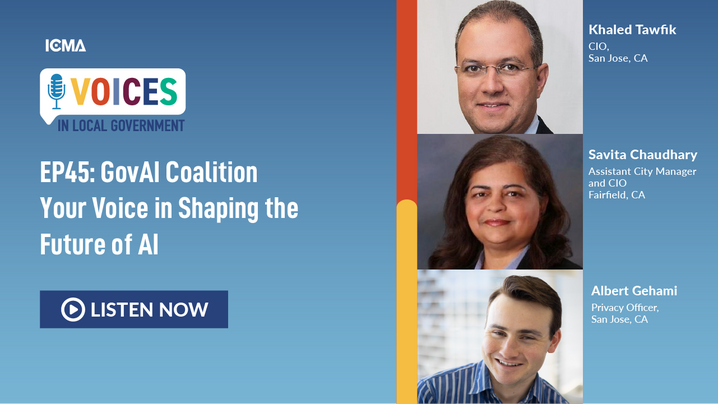
EP45 of ICMA's Voices in Local Government podcast covered the Government AI Coalition. Savita Chaudhary, assistant city manager and CIO, Fairfield, California; Khaled Tawfik, CIO, San José, California; and Albert Gehami, privacy officer, San José, California, covered the coalition's mission, why individuals, departments, and entire local governments should formally join, and how its membership/committee structure is open and important for all, regardless of technology skill level, geography, or population size.
Once an individual or organization is a member of the coalition, each of the seven committees is available to join as a visiting member with no specific time commitments or ongoing responsibilities, or the possibility to become a core member with some specific tasks. More details on the purpose, responsibilities, and structure are outlined below, and interest in learning more about any or all committees can be indicated on the coalition's free general membership application form.
Policy Committee
Purpose: Review new AI policies to stay updated on the legislative landscape and make additional edits to policy templates as needed.
Member Responsibilities: Come to quarterly meetings prepared to discuss updates on recent AI legislation or make recommendations on edits to existing policy templates. Members of the committee may help with making edits or conducting policy research.
Meeting Structure: Co-chairs facilitate discussions surrounding new AI policies and proposed edits to existing policy templates.
Use Cases Committee
Purpose: Help agencies share knowledge and collaborate on AI use cases.
Member Responsibilities: Come to meetings prepared to discuss potential use cases and coordinate pilot projects. Core members may also help visiting agencies complete use case templates and organize submitted use case templates.
Meeting Structure: Co-chairs facilitate discussions surrounding the use cases all members are considering and different options for pilot projects. Core members may also use the time as interactive office hours to provide support to visiting members on use case execution.
Adoption Support Committee
Purpose: Provide ongoing support to help agencies adopt and implement coalition templates.
Member Responsibilities: Committee meeting times will be used by committee members to hold interactive office hours. Core members will answer questions from visiting member agencies to help them understand how they can implement and adopt Phase I deliverables. Core members may also create implementation guides of FAQs documents to proactively answer visiting member agency questions.
Meeting Structure: Core members will lead independent breakout sessions to answer specific adoption support question types.
Cooperative Purchasing Committee
Purpose: Facilitate creation of cooperative purchasing agreements among member agencies
Member Responsibilities: Members will be able to spearhead the development of cooperative purchasing agreements they have interest in leading. This may include reaching out to agencies who have demonstrated interest in the same use cases and working with vendors to create such agreements.
Meeting Structure: The first meeting will be focused on aligning on committee goals and responsibilities. Future meetings may not occur until a use case is determined for a potential cooperative purchasing agreement. Once a use case is established, the committee will meet to plan the steps to work with relevant vendor(s).
Vendor Registry Committee
Purpose: Design and build out a scalable version of the Vendor Registry from Phase 1
Member Responsibilities: Maintain the Vendor Registry MVP from Phase 1 outside of synchronous meetings, such as by answering questions from vendors who hope to join the registry. For execution of a more mature registry, meet to discuss options for registry developers and subsequently oversee the implementation of the registry.
Meeting Structure: Co-chairs facilitate discussions to evaluate and select a developer to build out the registry. The city of San José, will populate the Phase I Registry and provide updates to the committee.
Funding Committee
Purpose: Find and apply for funding opportunities for the coalition.
Member Responsibilities: Come to meetings prepared to discuss potential funding opportunities and next steps for funding applications. Members should conduct research outside of meetings on funding opportunities and send any they find to the committee.
Meeting Structure: Co-chairs facilitate discussions surrounding funding opportunities and the steps needed to apply for them.
External Affairs Committee
Purpose: Coordinate communications with the public and build partnerships with external organizations (i.e., industry, universities, etc.)
Member Responsibilities: Come to meetings prepared to discuss options for partners, pathways to building partnerships with them, and strategies for effectively communicating coalition efforts to the public. Members may have to reach out to potential partners and draft communication messages.
Meeting Structure: Co-chairs facilitate discussions surrounding partnerships and communications strategies.
GovAI Coalition committees is the chance to learn and share with your peers, contribute to the group's mission, and ensure professional managers have a voice in how AI will impact the future of local government. Sign up for free membership and learn more about committee options.
Explore the Future of AI in Local Government June 5-7
ICMA will be in Palm Desert, California, for the second of two Local Government Reimagined Conferences. From cutting-edge applications to strategic insights, discover how AI is reshaping the landscape of local government. Register here.
New, Reduced Membership Dues
A new, reduced dues rate is available for CAOs/ACAOs, along with additional discounts for those in smaller communities, has been implemented. Learn more and be sure to join or renew today!

